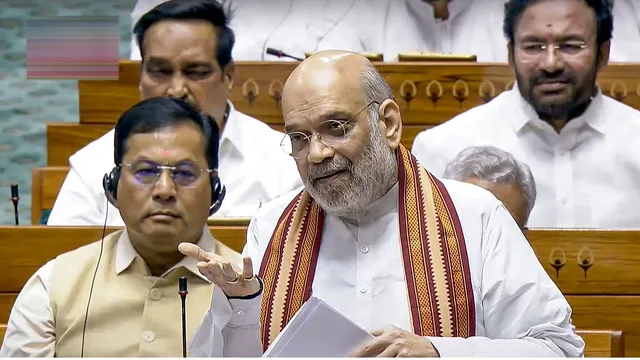Indian politics never fails to keep the spotlight on Parliament, and this week was no exception. The Amit Shah bills introduced in the Lok Sabha sparked heated debates, protests, and raised eyebrows across the country. With amendments targeting the Constitution, Jammu and Kashmir governance, and even the fast-growing online gaming sector, the Monsoon Session of 2025 has quickly turned into one of the most talked-about events of the year.
So, what’s really happening inside the walls of Parliament? Why are these bills creating such an uproar, and what do they mean for ordinary citizens? Let’s break it down step by step.
The Big Picture: Why This Parliament Session Matters
This week’s session isn’t just another political gathering—it’s a turning point. Union Home Minister Amit Shah came prepared with multiple bills that touch on sensitive issues ranging from the future of elected representatives to online gaming regulations. Add to this the Opposition’s protests over alleged irregularities in voter lists, and you get a Parliament session that feels more like a political battlefield than a place of debate.
The key highlight? The Amit Shah bills that are being debated and challenged across the political spectrum.
Amit Shah Bills: What’s on the Table?
On Wednesday, Amit Shah introduced three major bills in the Lok Sabha:
- The Constitution (130th Amendment) Bill, 2025
Aimed at removing Central or State Ministers, including Chief Ministers, if they face serious criminal charges and remain under custody for more than 30 days. - The Government of Union Territories (Amendment) Bill, 2025
Focused on governance reforms for Union Territories, strengthening accountability. - The Jammu and Kashmir Reorganisation (Amendment) Bill, 2025
Designed to provide legal grounds for removing a CM or Minister in case of detention over criminal allegations.
Alongside these, another significant piece of legislation was also listed:
- The Promotion and Regulation of Online Gaming Bill, 2025
Introduced by IT Minister Ashwini Vaishnaw, it seeks to regulate e-sports, educational gaming, and social gaming while banning money-based online games across state borders.
Together, these legislations form the crux of the Amit Shah bills agenda.
The Constitution Amendment Bill, 2025: A Controversial Move
One of the most debated bills introduced by Amit Shah is the Constitution (130th Amendment) Bill. At first glance, it looks like an anti-corruption measure—removing ministers who face serious criminal charges. Sounds fair, right? But here’s the twist.
Opposition leaders argue that this bill gives the Centre too much power to destabilize non-BJP state governments. Imagine this: if a Chief Minister is arrested (even without conviction), they could be stripped of office within 30 days. Critics say this bypasses the judiciary and opens the door to misuse by investigative agencies.
Priyanka Gandhi Vadra even called it “absolutely anti-constitutional, undemocratic, and very unfortunate.” Others, like RSP MP N K Premachandran, warned that the bill has an “ulterior motive.”
So, while the government presents it as a step towards accountability, the Opposition sees it as a political weapon.
The J&K Reorganisation (Amendment) Bill: A Sensitive Tweak
Jammu and Kashmir has always been at the center of India’s political debates. The Amit Shah bills brought another amendment to the 2019 Reorganisation Act. This one specifically targets Section 54, allowing the removal of a CM or Minister if detained for serious criminal charges.
The official justification? To uphold “constitutional morality and good governance.” But again, critics fear misuse. In a region already struggling with political trust, such a move could deepen divisions instead of building confidence.
Union Territories (Amendment) Bill: Strengthening Governance or Tightening Control?
Another part of the Amit Shah bills package is aimed at Union Territories. The amendment is design to bring “better governance” and “streamlin accountability.” While this sounds like routine administrative reform, Opposition MPs see it as yet another attempt by the Centre to centralize power.
The Online Gaming Regulation Bill: A First of Its Kind
Moving away from constitutional matters, let’s talk about gaming. India’s youth are glued to their phones, and online gaming is booming. But with this growth comes risks: addiction, financial losses, and even cross-border betting scandals.
Enter the Promotion and Regulation of Online Gaming Bill, 2025. Brought forward alongside the Amit Shah bills, this legislation bans money-based online games while promoting safer categories like e-sports and educational games. It also creates a regulatory authority to oversee the industry.
The government says it wants to “protect individuals, especially youth and vulnerable populations, from adverse social, economic, and psychological impacts.” In simple words, they want to stop gaming from turning into gambling. But gamers and tech companies fear over-regulation could stifle innovation.
Opposition Protests: The SIR Issue and Beyond
While the Amit Shah bills were introduce, the Opposition wasn’t sitting quietly. Their main demand? A discussion on the Special Intensive Revision (SIR) of electoral rolls in Bihar. They allege large-scale irregularities, even calling it “vote chori.”
The uproar was so loud that Rajya Sabha proceedings were adjourned multiple times, with slogans, banners, and protests disrupting the session. Lok Sabha Speaker Om Birla even had to remind MPs not to bring placards and sticks inside the House.
Why the Opposition Smells a Political Strategy
For the INDIA bloc and other Opposition parties, the Amit Shah bills are not just about governance—they’re about politics. Leaders like Mahua Moitra and Abhishek Singhvi accused the government of trying to “destabilize opposition-ruled states” by misusing central agencies like ED and CBI. According to them, this is less about cleaning corruption and more about consolidating power.
Some even called the bills a “desperate attempt” to shift attention away from Rahul Gandhi’s ‘Vote Adhikar Yatra,’ which has been gaining traction in Bihar.
The Vice-President Election Drama
Adding another layer of intensity, the Vice-President elections are around the corner. NDA’s candidate, C P Radhakrishnan, has already filed his nomination, backed by PM Modi and senior leaders. On the other hand, the INDIA bloc fielded B Sudershan Reddy. Both sides insist it’s not a personal battle but a test of political strength in Parliament.
The timing couldn’t be more interesting—while the Amit Shah bills dominate legislative discussions, the VP election is shaping up as a symbolic fight between the ruling and opposition alliances.
Public Sentiment: What Do Citizens Think?
For the common citizen, the legal jargon of the Amit Shah bills might feel distant, but their implications are real. If gaming is regulate, it affects millions of youth. CMs can remove without conviction, it changes the balance of power in Indian federalism. If governance in Union Territories is reshape, it impacts everyday administration.
On social media, opinions are split. Some see the bills as necessary reforms, while others worry about a slippery slope toward authoritarianism.
Read More: Hero Glamour X Launched: India’s Most Affordable 125cc Bike With Cruise Control
Conclusion
The Amit Shah bills introduced in the Lok Sabha represent more than just legislative changes—they signal a tug-of-war between accountability and power. While the government insists these measures strengthen democracy, the Opposition warns they weaken it.
With protests disrupting Parliament, gaming companies on edge, and the Vice-President election adding fuel to the fire, one thing is clear: Indian politics is head for a heated few months. Whether these bills turn into law or get stuck in endless debates, they’ve already reshape the national conversation.







